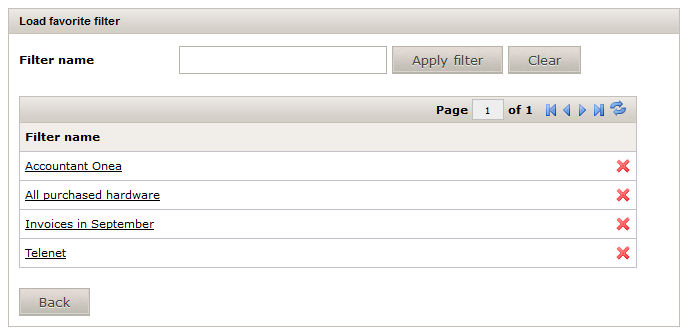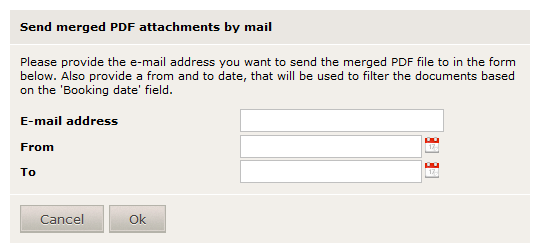Difference between revisions of "Performing support tasks"
(→Searching for invoices) |
(→Exporting documents to Excel) |
||
| Line 79: | Line 79: | ||
==Exporting documents to Excel== | ==Exporting documents to Excel== | ||
| − | From the archive, it's possible to export documents to Excel. | + | From the archive, it's possible to export documents to Excel.<br/> |
| − | <br/> | + | <br/> |
| − | |||
Select the documents you would like to export by using the checkboxes [[image:unselected.png|link=]] in front of them. Documents are selected when the checkboxes looks like this: [[image:selected.png|link=]].<br/> | Select the documents you would like to export by using the checkboxes [[image:unselected.png|link=]] in front of them. Documents are selected when the checkboxes looks like this: [[image:selected.png|link=]].<br/> | ||
Click on the [[image:pageXls.png|link=]] "Export to Excel" button to export the documents.<br/> | Click on the [[image:pageXls.png|link=]] "Export to Excel" button to export the documents.<br/> | ||
| Line 88: | Line 87: | ||
[[image:export_excel.png|link=]]<br/> | [[image:export_excel.png|link=]]<br/> | ||
<br/> | <br/> | ||
| − | This screen allows you to configure | + | This screen allows you to configure the fields to be exported before the actual export. Following fields are available: |
* '''Export all header fields''': export all available header fields, not only the header fields that are shown in the archivelist. | * '''Export all header fields''': export all available header fields, not only the header fields that are shown in the archivelist. | ||
* '''Include lines''': include all lines in the export. Possible values are: | * '''Include lines''': include all lines in the export. Possible values are: | ||
| Line 94: | Line 93: | ||
** ''Detail line fields'': include all fields of the detail lines. | ** ''Detail line fields'': include all fields of the detail lines. | ||
<br/>{{warning|Detail line fields are VIS only!}}<br/> | <br/>{{warning|Detail line fields are VIS only!}}<br/> | ||
| + | {{info|The header data will be repeated in case multiple posting lines will be exported. For example: when having a document with 2 posting lines, the Excel file will have the data of 2 posting lines with the same header data next to it.}}<br/> | ||
==Exporting documents to PDF== | ==Exporting documents to PDF== | ||
Revision as of 12:36, 28 August 2017
Contents
1 Searching for invoices
In the 1Archive system, any user is allowed to search for documents by using the filter above the archivelist.
| It's only possible to search for documents when you are in the archive. |
Next to the selected document type, there are two icons available for searching documents:
-
 "Open filter": opens the filter screen.
"Open filter": opens the filter screen. -
 "Open favorite filter": opens a screen with your favorite filters in it.
"Open favorite filter": opens a screen with your favorite filters in it.
1.1 Using the filter
When opening the filter, following screen appears:

| Depending upon your environment, the selected field could be different. |
Following fields are available:
- Field: choose the field on which you would like to filter the documents.
| The available fields are all header-, technical- and posting line fields from your environment. See "Validating invoices" for all available fields. |
- Operator: choose the operator on which you would like to filter. Possible values are:
- Include: the field includes the value(s) provided.
- Exclude: the field excludes the value(s) provided.
- Empty: choose this in case you want to check on an empty value.
- From and To: the value of the field has to lie in between these two values.
| Certain fields only have the possibility to enter a From value. |
| Based on the type of the selected field, it's possible to either type in text, select from a |
| Tip: it is possible to search for multiple values inside one filter box by using a semicolon (;). But this only works for text fields, not for numeric, date and lookuplist fields! Example: enter 2017032101;2017032102 to search for invoices with invoice number 2017032101 and 2017032102. |
| If you would like to filter on one particular value, add this in the From field |
Adding an extra line to filter on is done via the ![]() "Add" button in the left upper corner of the filter screen.
"Add" button in the left upper corner of the filter screen.
Removing a line is done via the ![]() "Remove" button in front of each line.
"Remove" button in front of each line.
At the bottom of the filter screen, there are four different buttons available:
-
 "Close filter": hides the filter screen.
"Close filter": hides the filter screen.
| Note that clicking |
| When a filter is closed, it can be reopened easily by clicking the |
-
 "Clear filter": remove all applied filters.
"Clear filter": remove all applied filters. -
 "Apply filter": applies the filter on the list of documents.
"Apply filter": applies the filter on the list of documents.
| Note that the filter icon next to the document type will color red |
-
 "Save filter": save a filter in your favorite filters.
"Save filter": save a filter in your favorite filters.
Clicking this button results in the appearance of a pop-up screen where you have to name the filter. |
1.2 Using favorite filters
When opening your favorite filters, following screen appears:

Selecting a filter to apply on the list of documents can be done by clicking the name of the filter.
Removing a filter from your favorites can be done by using the ![]() "Remove" button.
"Remove" button.
You can search for a filter using the textbox on top of the screen. Type a value and click "Apply filter" to search. Removing your search can be done by clicking the "Clear" button.
1.3 Filter on validation status
Something worth mentioning is the ability to filter on validation status.

Values to filter on are:
- In progress: the document still needs to be validated in the 1Archive system.
- Valid: the document is completely valid and contains no red or yellow fields.
- Invalid: the document is invalid and contains red or yellow fields.
2 Using wildcards
In order to facilitate your search, you can make use of wildcards. There are two wildcards available:
- *
- %
Both wildcards work as follows:
- *text or %text: searches for all values ending with value "text".
- text* or text%: searches for all values beginning with value "text".
- te*xt or te%xt: searches for all values beginning with "te" and ending with "xt".
| If you just type "text", the search will be based on "text*". |
| Searching for values in 1Archive is not case sensitive. |
| Using these wildcards is only possible in search dialogs. For example: the search dialog for suppliers in the document view. |
3 Exporting documents to Excel
From the archive, it's possible to export documents to Excel.
Select the documents you would like to export by using the checkboxes ![]() in front of them. Documents are selected when the checkboxes looks like this:
in front of them. Documents are selected when the checkboxes looks like this: ![]() .
.
Click on the ![]() "Export to Excel" button to export the documents.
"Export to Excel" button to export the documents.
When clicking this button, following screen is added above the archivelist:

This screen allows you to configure the fields to be exported before the actual export. Following fields are available:
- Export all header fields: export all available header fields, not only the header fields that are shown in the archivelist.
- Include lines: include all lines in the export. Possible values are:
- Posting line fields: include all fields of the posting lines.
- Detail line fields: include all fields of the detail lines.
| Detail line fields are VIS only! |
| The header data will be repeated in case multiple posting lines will be exported. For example: when having a document with 2 posting lines, the Excel file will have the data of 2 posting lines with the same header data next to it. |
4 Exporting documents to PDF
From the archive, it's possible to export documents to PDF.
Select the documents you would like to export by using the checkboxes ![]() in front of them. Documents are selected when the checkboxes look like this:
in front of them. Documents are selected when the checkboxes look like this: ![]() .
.
Click on the ![]() "Export to PDF" button to export the documents.
"Export to PDF" button to export the documents.
| All images, including the attachments, will be exported. |
| Only exportable attachments will be included! |
| For each document, a bookmark will be created in the PDF file. This bookmark is based on the ID the document has in 1Archive. |
5 Exporting documents to XML
| This functionality is currently not in use. |
6 Exporting documents to Zip
From the archive, it's possible to export documents to a Zip-file.
Select the documents you would like to export using the checkboxes ![]() in front of them. Documents are selected when the checkboxes look like this:
in front of them. Documents are selected when the checkboxes look like this: ![]() .
.
Click on the ![]() "Export to Zip" button to export the documents.
"Export to Zip" button to export the documents.
| The Zip-file contains a folder for each document you selected with all exportable images in it. |
7 Mail as PDF
When in the archive, the left sidebar shows a ![]() "Mail as PDF" button. Clicking this button results in following screen that appears:
"Mail as PDF" button. Clicking this button results in following screen that appears:

Following fields are available:
- E-mail address: provide the e-mail address you wish to send the documents to. Default value will be the e-mail address of the currently logged in user.
- From and To: provide the dates between which the voucher dates of the documents you would like to send are.
Click "Ok" to submit the data and send a merged PDF-file with all documents with voucher dates between the "From" and "To" date.
8 Full text search
The full text search functionality allows you to search for a value in all data of a document. All data of a document means:
- header fields
- technical fields
- posting line fields
- detail line fields (in case of VIS)
- the image(s)
Using this functionality is possible via the textbox above the archivelist.
![]()
Type a value and press the ![]() "Search in documents" button to search for documents.
"Search in documents" button to search for documents.
| It's not possible to specify the field(s) on which needs to be filtered. The full text search functionality will search in all fields of the document. |
Example
You bought a notebook 1,5 year ago. The image of the invoice contains the serial number of the notebook, but this number isn't stored in any of the header-, technical-, posting line- or detail line fields. By entering the serial number in the full text search field, the correct document can be found.
| If the serial number is constructed with dots in between (like 123.456.789 for example), you need to search for that exact value to be able to find it. Don't change the dots in spaces. |
| Wildcards can also be used in the full text search functionality. Note that this can slow down the speed of searching. |